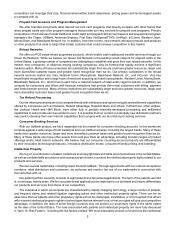Green Dot 2015 Annual Report Download - page 21
Download and view the complete annual report
Please find page 21 of the 2015 Green Dot annual report below. You can navigate through the pages in the report by either clicking on the pages listed below, or by using the keyword search tool below to find specific information within the annual report.15
• liability for activities of the acquired company prior to the acquisition, including violations of law, commercial
disputes, and tax and other known and unknown liabilities; and
• increased litigation or other claims in connection with the acquired company, including claims brought by
terminated employees, customers, former stockholders or other third parties.
If we are unable to successfully integrate an acquired business or technology or otherwise address these difficulties
and challenges or other problems encountered in connection with an acquisition, we might not realize the anticipated
benefits of that acquisition, we might incur unanticipated liabilities or we might otherwise suffer harm to our business
generally. Unanticipated costs, delays or other operational or financial problems related to integrating the acquired
company and business with our company may result in the diversion of our management's attention from other business
issues and opportunities. To integrate acquired businesses, we must implement our technology systems in the acquired
operations and integrate and manage the personnel of the acquired operations. We also must effectively integrate the
different cultures of acquired business organizations into our own in a way that aligns various interests, and may need
to enter new markets in which we have no or limited experience and where competitors in such markets have stronger
market positions. Failures or difficulties in integrating the operations of the businesses that we acquire, including their
personnel, technology, compliance programs, risk management systems, financial systems, distribution and general
business operations and procedures, marketing, promotion and other relationships, may affect our ability to grow and
may result in us incurring asset impairment or restructuring charges. Furthermore, acquisitions and investments are
often speculative in nature and the actual benefits we derive from them could be lower or take longer to materialize
than we expect.
To the extent we pay the consideration for any future acquisitions or investments in cash, it would reduce the
amount of cash available to us for other purposes. Future acquisitions or investments could also result in dilutive
issuances of our equity securities or the incurrence of debt, contingent liabilities, amortization expenses, or impairment
charges against goodwill on our balance sheet, any of which could harm our financial condition and negatively impact
our stockholders.
Fraudulent and other illegal activity involving our products and services could lead to reputational damage
to us, reduce the use and acceptance of our cards and reload network, reduce the use of our tax refund
processing services, and may adversely affect our financial position and results of operations.
Criminals are using increasingly sophisticated methods to engage in illegal activities involving prepaid cards, reload
products or customer information. In addition, to the extent our checking account products become widely adopted by
consumers, we expect that criminals will target our checking account products as well. Illegal activities involving our
products and services often include malicious social engineering schemes, where people are asked to provide a prepaid
card or reload product in order to obtain a loan or purchase goods or services. Illegal activities may also include
fraudulent payment or refund schemes and identity theft. We rely upon third parties for some transaction processing
services, which subjects us and our customers to risks related to the vulnerabilities of those third parties. A single
significant incident of fraud, or increases in the overall level of fraud, involving our cards and other products and
services, could result in reputational damage to us, which could reduce the use and acceptance of our cards and other
products and services, cause retail distributors or network acceptance members to cease doing business with us or
lead to greater regulation that would increase our compliance costs. Fraudulent activity could also result in the imposition
of regulatory sanctions, including significant monetary fines, which could adversely affect our business, operating
results and financial condition. Furthermore, to address the challenges we face with respect to fraudulent activity, we've
implemented risk control mechanisms that have made it more difficult for all customers, including legitimate customers,
to obtain and use our products and services. We believe it is likely that our risk control mechanisms may continue to
adversely affect our new card activations from legitimate customers for the foreseeable future and that our operating
revenues will be negatively impacted as a result.
As a bank holding company, we are subject to extensive and potentially changing regulation and may be
required to serve as a source of strength for Green Dot Bank, which may adversely affect our business, financial
position and results of operations.
As a bank holding company, we are subject to comprehensive supervision and examination by the Federal Reserve
Board and the State of Utah Department of Financial Institutions and must comply with applicable regulations and
other commitments we have agreed to, including financial commitments in respect to minimum capital and leverage
requirements. If we fail to comply with any of these requirements, we may become subject to formal or informal
enforcement actions, proceedings, or investigations, which could result in regulatory orders, restrictions on our business
operations or requirements to take corrective actions, which may, individually or in the aggregate, affect our results of
operations and restrict our ability to grow. If we fail to comply with the applicable capital and leverage requirements,
or if our subsidiary bank fails to comply with its applicable capital and leverage commitments, the Federal Reserve
























